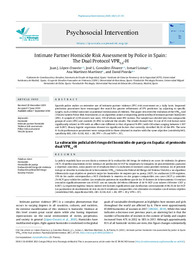Título :
Intimate Partner Homicide Risk Assessment by Police in Spain: The Dual Protocol VPR-H |
Autor :
López-Ossorio, Juan J.
González-Álvarez, José L.
Loinaz, Ismael
Martínez Martínez, Ana
Pineda, David  |
Editor :
Colegio Oficial de la Psicología de Madrid |
Departamento:
Departamentos de la UMH::Psicología de la Salud |
Fecha de publicación:
2020-09 |
URI :
https://hdl.handle.net/11000/35024 |
Resumen :
Objective: This study compared the long-term effects of a mindful compassion program on improving depression in lung cancer patients, both in patient-caregiver dyads and in patient-only groups, and examined the moderating roles of anxiety and quality of life (QOL). Method: Participants consisted of 56 dyads, who were randomly assigned to either the dyadic or patient-only groups. Data collection included various assessments at different time points: baseline (T0), end of intervention (T1), and follow-up at the 5th month (T2), 8th month (T3), and 14th month (T4). Results: Patients in the dyadic group experienced a significant reduction in depressive symptoms. The dyadic intervention was particularly beneficial for younger patients and those with higher baseline QOL symptom distress. Improvements in patients’ mindfulness and self-compassion contributed to reduced depression by enhancing general health and lowering anxiety. Additionally, caregivers’ self-compassion played a role in reducing patients’ depression by improving patients’ QOL functioning and decreasing anxiety. Conclusions: Mindfulness and compassion interventions, whether provided dyadically or individually, can be tailored to each patient’s specific condition.
|
Palabras clave/Materias:
Dyadic depression program
Depressive symptoms
Anxiety
Mindfulness awareness
Self-compassion |
Área de conocimiento :
CDU: Filosofía y psicología: Psicología |
Tipo de documento :
info:eu-repo/semantics/article |
Derechos de acceso:
info:eu-repo/semantics/openAccess
Attribution-NonCommercial-NoDerivatives 4.0 Internacional |
DOI :
https://doi.org/10.5093/pi2020a16 |
Publicado en:
Psychosocial Intervention (2021) 30(1) 47-55 |
Aparece en las colecciones:
Artículos- Psicología de la Salud
|
 La licencia se describe como: Atribución-NonComercial-NoDerivada 4.0 Internacional.
La licencia se describe como: Atribución-NonComercial-NoDerivada 4.0 Internacional.
.png)
